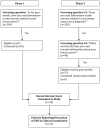Cancer-related internet information communication between oncologists and patients with breast cancer: a qualitative study
- PMID: 25631285
- PMCID: PMC4517971
- DOI: 10.1002/pon.3752
Cancer-related internet information communication between oncologists and patients with breast cancer: a qualitative study
Abstract
Objective: Many patients with cancer search out information about their cancer on the internet, thus affecting their relationship with their oncologists. An in-depth analysis of patient-physician communication about information obtained from the internet is currently lacking.
Methods: We audio-recorded visits of patients with breast cancer and their oncologists where internet information was expected to be discussed. Inductive thematic text analysis was used to identify qualitative themes from these conversations.
Results: Twenty-one patients self-reported discussing cancer-related internet information (CRII) with their oncologists; 16 audio recordings contained detectable discussions of CRII and were analyzed. Results indicated that oncologists and patients initiated CRII discussions implicitly and explicitly. Oncologists responded positively to patient-initiated CRII discussions by (1) acknowledging their limited expertise/knowledge, (2) encouraging/approving using the internet as an information resource, (3) providing information/guidance on the proper use of internet searches, (4) discussing the pros and cons of relevant treatment options, or (5) giving information. Finally, patients reacted to the CRII discussions by (1) indicating that they only used reputable sources/websites, (2) asking for further explanation of information, (3) expressing continued concern, or (4) asking for the oncologist's opinion or recommendation.
Conclusions: These results indicate that the majority of patients introduce internet information implicitly, in order to guard against any threat to their self-esteem. Physicians, in turn, seem to respond in a supportive fashion to reduce any threat experienced. Future interventions may consider providing prescription-based guidance on how to navigate the internet as a health information resource and to encourage patients to bring these topics up with their oncologist.
Copyright © 2015 John Wiley & Sons, Ltd.
Similar articles
-
Perspectives of healthcare professionals on patient Internet use during the cancer experience.Eur J Cancer Care (Engl). 2019 Jan;28(1):e12953. doi: 10.1111/ecc.12953. Epub 2018 Oct 30. Eur J Cancer Care (Engl). 2019. PMID: 30378209
-
Toward a greater understanding of breast cancer patients' decisions to discuss cancer-related internet information with their doctors: an exploratory study.Patient Educ Couns. 2012 Oct;89(1):109-15. doi: 10.1016/j.pec.2012.05.008. Epub 2012 Jun 19. Patient Educ Couns. 2012. PMID: 22722063 Free PMC article.
-
Patient perspectives on online health information and communication with doctors: a qualitative study of patients 50 years old and over.J Med Internet Res. 2015 Jan 13;17(1):e19. doi: 10.2196/jmir.3588. J Med Internet Res. 2015. PMID: 25586865 Free PMC article.
-
Impact of the Internet on Patient-Physician Communication.Eur Urol Focus. 2020 May 15;6(3):440-444. doi: 10.1016/j.euf.2019.09.012. Epub 2019 Oct 1. Eur Urol Focus. 2020. PMID: 31582312 Review.
-
Breast cancer in the information age: a review of recent developments.Breast Dis. 2004;21:41-6. doi: 10.3233/bd-2004-21106. Breast Dis. 2004. PMID: 15687721 Review.
Cited by
-
How Physicians Tackle Internet-Misinformed Patients: Going Beyond Traditional Patient-Centered Communication - A Study Protocol.Adv Med Educ Pract. 2023 Sep 6;14:983-988. doi: 10.2147/AMEP.S425434. eCollection 2023. Adv Med Educ Pract. 2023. PMID: 37701424 Free PMC article.
-
Talking with clinicians about online cancer information: a survey of cancer patients and surrogate information seekers.Support Care Cancer. 2024 May 17;32(6):362. doi: 10.1007/s00520-024-08578-0. Support Care Cancer. 2024. PMID: 38755329
-
Prevalence and Outcomes of Web-Based Health Information Seeking for Acute Symptoms: Cross-Sectional Study.J Med Internet Res. 2020 Jan 10;22(1):e15148. doi: 10.2196/15148. J Med Internet Res. 2020. PMID: 31922490 Free PMC article.
-
Perceptions of Health Misinformation on Social Media: Cross-Sectional Survey Study.JMIR Infodemiology. 2024 Apr 30;4:e51127. doi: 10.2196/51127. JMIR Infodemiology. 2024. PMID: 38687591 Free PMC article.
-
The Characteristics, Uses, and Biases of Studies Related to Malignancies Using Google Trends: Systematic Review.J Med Internet Res. 2023 Aug 4;25:e47582. doi: 10.2196/47582. J Med Internet Res. 2023. PMID: 37540544 Free PMC article.
References
-
- Pew Forum Pew Internet and American Life Project. 2013 (Available from: http://www.pewinternet.org/fact-sheets/health-fact-sheet/
-
- Basch EM, Thaler HT, Shi W, Yakren S, Schrag D. Use of information resources by patients with cancer and their companions. Cancer. 2004;100(11):2476–2483. - PubMed
-
- Monnier J, Laken M, Carter CL. Patient and caregiver interest in internet-based cancer services. Cancer Pract. 2002;10(6):305–310. - PubMed
-
- Ranson S, Morrow GR, Dakhil S, et al. Internet use among 1020 cancer patients assessed in community practices: a URCC CCOP study. Paper presented at: Proc Am Soc Clin Oncol. 2003
-
- Metz JM, Devine P, DeNittis A, et al. A multi-institutional study of internet utilization by radiation oncology patients. Int J Radiat Oncol Biol Phys. 2003;56(4):1201–1205. - PubMed
Publication types
MeSH terms
Grants and funding
LinkOut - more resources
Full Text Sources
Other Literature Sources
Medical
Miscellaneous


